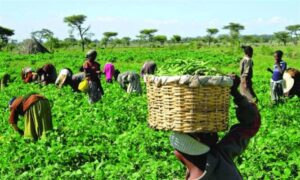BY FOLASADE AKPA
Breastfeeding is widely recognised as the single most important source of nutrition for infants in the first months of life. It is a low-cost, life-saving practice that also delivers long-term gains for cognition, health, and the economy.
Regrettably, in Nigeria, many mothers still struggle to breastfeed exclusively for the recommended six months or to continue breastfeeding alongside complementary feeding of up to two years because of weak systems of support at home, in health facilities, and at work.
The World Breastfeeding Week (WBW) is observed globally, annually, from Aug. 1 to Aug. 7.
The theme for 2025 WBW, “Prioritise Breastfeeding: Create Sustainable Support Systems”, underscores the critical role of breast milk in child survival, growth, and healthy development.
The United Nations Children’s Fund (UNICEF) expressed concern over stagnating exclusive breastfeeding rates in Nigeria, which remain at just 29 per cent.
The fund said that while more than 90 per cent of mothers in Nigeria breastfeed, the rate of early initiation of breastfeeding has declined, from 42 per cent in 2018 to 36 per cent in 2023.
According to UNICEF, data from the 2023–2024 National Demographic and Health Survey (NDHS) reveals troubling trends in optimal breastfeeding practices.
“Only 23 per cent of babies are breastfed up to the recommended age of two years.
“Just 12 of Nigeria’s 36 states, including the Federal Capital Territory, currently offer paid maternity leave for up to six months,” the fund said.
To reverse the negative trend, UNICEF emphasised the need for mothers to be supported at home, in healthcare facilities, and at work.
The agency recommended initiating breastfeeding within the first hour of birth, exclusively breastfeeding for the first six months, and continuing breastfeeding with complementary foods up to at least 24 months.
Giving a mother’s perspective, Mrs Folasade Adediran, a teacher and mother of three, described her breastfeeding journey as both rewarding and challenging.
“Being a breastfeeding mother is not an easy task; sometimes, it can be overwhelming but with the kind of people I am surrounded with, their words and encouragement have kept me going; I must say, I am a lucky person.
“Breastfeeding a child in public transport is quite challenging but I think I am beginning to overcome it.” She confirmed that during antenatal, mothers were taught the importance of breast milk to their infants which had been impactful.
Adediran said it was in those teachings she learnt that children who are given only breast milk for the first six months are always more healthy and stronger.
“I did it while nursing my first child and before she was eight months she had started walking and at the same time, she was teething.
“As a result, I have promised myself that any child that comes out of me must enjoy that privilege that is apart from the fact that it saves you money.”
On how she manages being at work and breastfeeding, she said that it was very inconvenient as she might be called upon at any time to attend to the baby.
“Being a teacher, you cannot leave your lesson halfway during class, and at the same time, you cannot leave your child to keep crying.
“Most of the times, I express breast milk but along the line, it gets finished before the close of the day, so managing work and breastfeeding is not easy at all.
“I suggest that longer maternity leave would be best for working mothers for at least a period of six months for exclusive breastfeeding,” she said.
From an expert’s view, Ms Uju Onuorah, a nutritionist, described exclusive breastfeeding for the first six months as vital, providing “the perfect balance of nutrients in the right proportions to support a baby’s rapid growth and brain development.”
She said that colostrum, the first milk, was rich in antibodies that protected against infections such as diarrhoea, pneumonia, and ear infections, while breast milk adapted to meet changing needs.
On long-term benefits, she said that children who were breastfed had lower risks of diarrhoea and respiratory illness in infancy and, later, lower rates of obesity, type-two diabetes, and some allergic diseases, alongside modest but meaningful cognitive advantages.
“Mothers benefit from lower lifetime risk of breast and ovarian cancers, type -two diabetes, hypertension, and cardiovascular disease, including faster postpartum recovery.















